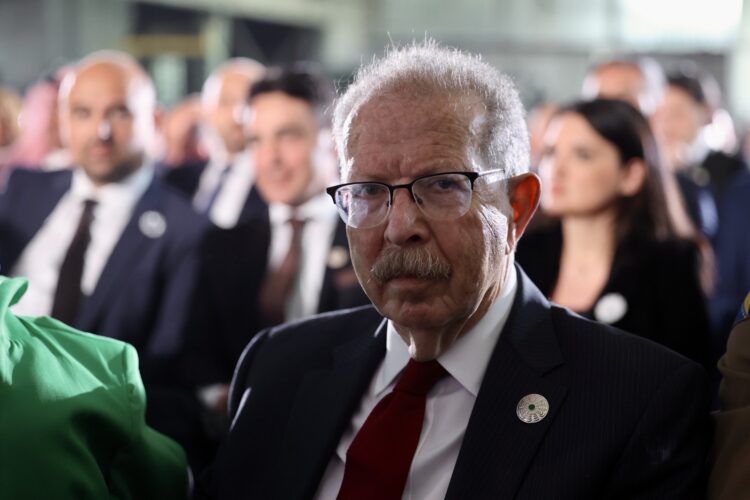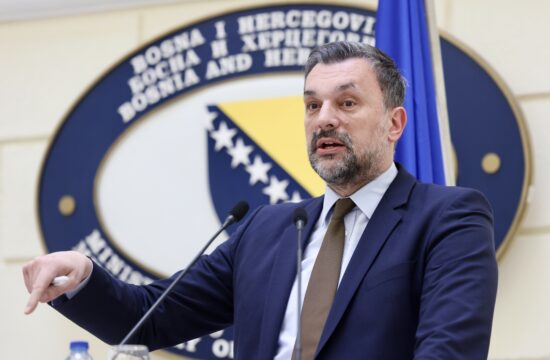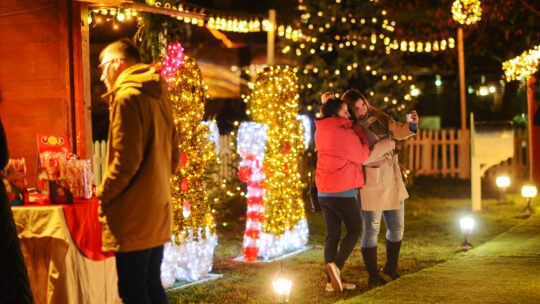
Menachem Z. Rosensaft, a former senior official of the World Jewish Congress, the son of two Holocaust survivors and a law professor specialising in genocide, was in Srebrenica this year to pay respects to the genocide victims, conveying strong messages from the site. “It is absolutely critical for the future of both the Jewish people and the (Muslim) Bosniak people, for us to join forces in remembrance in order to make sure that these type of atrocities not be allowed to occur in the future,” he said on July 11, 2023. Today, he condemns the atrocities committed by Hamas in the latest escalation of the Israel-Hamas conflict. “I have profound compassion and feel pain for every Palestinian civilian casualty in Gaza,” he says, adding, however, that “Israel has no choice but to eliminate Hamas.” Rosensaft discussed the issue with N1's Nikola Vucic.
Weeks after the October 7 Hamas attack, which left more than 1,400 Israelis dead, Rosensaft says that “Hamas is a genocidal terrorist organisation” and “there can be no discussion on that.”
Their intention is eliminating the Jews from, as they themselves say, the Jordan river and the Mediterranean and that is, he stressed, the definition of genocide.
“Now, that is not to say that Hamas represents the Palestinian people. It does not. And that is not to say that Hamas is acting on behalf of the Palestinian people as a whole,” he underlined.
In December 1988, Menachem was one of five American Jews who met in Stockholm for two days with Yasser Arafat and other leaders of the Palestine Liberation Organisation (PLO), at the invitation of the then Swedish Foreign Minister, Sten Anderson. The meeting resulted in the PLO's first public acceptance of Israel as a state in the Middle East.
‘Supporting Palestinian rights is legitimate but with condemnation of Hamas’
He recalled of an interesting detail of a conversation between him and Arafat, when he, after introducing himself said he was there “out of concern for the State of Israel and the people of Israel.” Arafat then interrupted him to say: “That makes two of us who are concerned about the people of Israel. Do we also have two who are concerned about the future of the Palestinian people?”
“When I hear people at demonstrations in Sarajevo and elsewhere express concern for Palestinian civilians in Gaza,” Menachem says, “I do not hear any concern for the Israeli Jews slaughtered by Hamas on October 7, or any condemnation of Hamas’ savagery. That, for me, is a serious problem.”
Asked how would he distinguish a pro-Palestinian demonstration and a rally in support of Hamas, because, as N1's Vucic pointed out, the solidarity in Bosnia so far has seemed dominantly connected with the Palestinians and not Hamas, he responded:
“Supporting Palestinian rights is legitimate, of course, and so is expressing concern for Palestinian civilian casualties in Gaza. But after October 7, this can no longer be done in a vacuum, without also repudiating and condemning Hamas. Those speaking at pro-Palestinian demonstrations in Bosnia must make clear that they unequivocally condemn the brutal Hamas murder of Israeli civilians, including women, children, infants and the elderly, just as they once upon a time condemned the genocide in Srebrenica. They must make clear that they unequivocally condemn the rape of Israeli women and girls by Hamas terrorists, just as they once upon a time condemned the rape of Bosniak women and girls by Bosnian Serb Chetniks at Foca and elsewhere. Otherwise, their silence, their failure to denounce and condemn Hamas, will be rightly interpreted as support for Hamas, and this is impermissible.”
Rosensaft elaborated on what is the recipe for the future, but also warned about the one leading to disaster.
“Peace and peaceful coexistence – indeed, any hope for a future not predicated on hatred and endless violence, requires recognition of and compassion for the humanity of the other. It also requires the unequivocal repudiation and condemnation of evil. And the politicians, religious leaders, politicians, and mobs who glorify Hamas and are concerned only about Palestinian civilians in Gaza but do not care anything about or have any compassion for the Jewish civilians – including women, children, infants, and the elderly – who were savagely slaughtered by Hamas are telling the world that they do not want peace, they do not want tolerance, they do not want to find a path for Israelis and Palestinians to coexist alongside each other. All they want is the destruction of Israel and the death of Israeli Jews. Such an attitude is a recipe for disaster,” said Rosensaft.
He made clear that the vicious cycle of hatred and killing cannot be tolerated:
“I feel the same way about the Jewish settlers who are engaged in violence against Palestinian civilians as I do about the Palestinians who engage in terrorism or violence against Israeli-Jewish civilians. That is not permissible.”
He described the conflict between Israel and Palestine as a conflict between two rights, not between the right and wrong. Both having their legitimate positions.
“Israel is entitled absolutely to exist in security. The Palestinians are entitled, in my view, absolutely to have their own state and to exist in safety and security alongside Israel,” said the prominent New York lawyer, adding, however, that this does not under any circumstances include the continued existence of Hamas as a threat to Israel.
Hamas, Rosensaft explained, came out in opposition to the negotiations between the PLO and later the Palestinian authority with Israel, and its charter “calls for the destruction of the state of Israel.”
The parallel between Chetnik movement and Hamas ideology
On several occasions during the conversation with Vucic, he made a comparison between Hamas and Chetniks, drawing a parallel between the Hamas ideologies and what the Chetnik movement did in Bosnia during the war of the 1990s. Based on that, he deems the support for Hamas at pro-Palestinian rallies in Bosnia is hypocritical.
“I repeat that Hamas is not the Palestinian people but Hamas is exploiting the Palestinians in Gaza for their purposes. Hamas is hiding behind the civilians in the same way that Adolf Hitler in his bunker in Berlin was hiding behind the civilians who were living in Berlin at the time,” he stressed. Because, he added, “supporting Hamas is supporting murder and slaughter of civilians, of women, of children, and for that there can be no ambiguity.”
Asked if he was surprised by the votes before the UN Security Council regarding the Middle East conflict, he said he was no longer surprised by what he called “political manoeuvring” and by Russia trying to appear as an arbiter that follows the rules of war under international law
Rosensaft went on to comment on the comparison of the current events in the Middle East to what happened in Srebrenica in 1995, more precisely, on the attempts to put a sign of equality between the suffering of the Bosniaks and that of the Palestinians.
Srebrenica was a genocide where unarmed men and boys were taken at the gunpoint and shot, he explained, while Israel gave time, two weeks, for the people of Gaza City and the south of the Gaza Strip to leave.
“Those are not comparable situations,” he said. “I don't want to say that the Palestinian in Gaza are not suffering today but there is no intention of destroying the Palestinian people on the part of Israel”.
Two states as a solution to the conflict
At the end of the conflict, there has to be a solution that will take into account the rights of the Palestinians and that will give both Israel and Palestinians their right to exist alongside one another, he underlined.
Speaking about possible solutions to the problem, he is clear – it is two states.
“Palestine, as a political entity, derives its legitimacy from precisely the same vote of the United Nations General Assembly on November 29, 1947 as the state of Israel,” he recalled, adding that this is a consideration for both.
“So, as far as I am concerned, and I am not the only one, the eventual goal and the eventual resolution of the conflict will have to be two states. The reality is that Palestine cannot and will not disappear from the map because there are millions of Palestinians living on the West Bank, and there are several millions of Palestinians living in Gaza, now in very dire conditions. And they all have to have something to look forward to.”
According to him, there has to be a goal. But, it cannot include Hamas.
“A Palestinian living today anywhere has to have a hope that there is a future for him or her as a part of the Palestinian state. But, that Palestinian state must be the Palestinian state that is going to live alongside Israel,” Rosensaft said, arguing that “no one would tolerate allowing anyone associated with Hamas to come within ten miles of Israel ever again.”
He dismissed the idea of some sort of a federation as not viable.
“A kind of a federated state works in Switzerland but had not worked in Yugoslavia and is not likely to work here,” he asserted. “The goal is to eliminate the hatred and violence first and to understand that those who are engaged in hatred and in killing, cannot be tolerated.”
After he denied the similarity between the suffering of the Palestinians in these events and the Bosniaks during the 1995 Srebrenica genocide, he made a comparison between the Srebrenica genocide and October 7th.
“It takes the existing, boiling conflict to a different level”, said Rosensaft, arguing that both events are something no one will forget and no one can tolerate. “Because, if your cause is a cause associated with murder, genocide and rape, it ceases to be a just cause.”
Rosensaft, a prominent member of the American Jewish community, strongly disagreed with the thesis proposed by Jewish Voice for Peace, a left-wing activist organisation that promotes the liberation of Palestinians and which claims that what is happening in Palestine now is an act of genocide.
“I do not believe that defending oneself and the right of self-defence result in genocide,” he stressed, adding, however, that “we all understand that there are civilian casualties” but that having civilian casualties in a war is in a different category than genocide.”
‘You cannot fight Islamophobia if you do not fight antisemitism’
Speaking of the antisemitism which comes as a consequence of the current events in the Middle East, he warned about the cases of Jewish students in the world being threatened despite the fact they have nothing to do with Israel.
“That is impermissible, and we need to put an end to it, and everyone starting with the Muslim religious leadership needs to condemn that. Because you cannot fight Islamophobia if you do not fight antisemitism. You cannot fight homophobia if you do not fight antisemitism and Islamophobia. Hatred begins with words, genocide and crimes against humanity begin with threats and with the dehumanization of the other, and unfortunately we know that this ends in Auschwitz, it ends in Srebrenica, it ends in October 7,” he stressed.
“We need our political leaders and religious leaders to also be moral leaders, who join together in affirming humanity not in affirming genocide,” he added.
Rosensaft was the head of the Jewish World Congress delegation this year at the commemoration and burial for the Srebrenica genocide victims, where he conveyed strong messages. In a text he wrote following the visit, Rosensaft expressed a firm belief that “it is only by making sure that all past and present horrors – Auschwitz, Srebrenica, Bergen-Belsen, Kigali, Bucha – are inexorably integrated into the world’s consciousness that we have at least a chance of prevailing against the forces of darkness, of bigotry, of antisemitism, of racism, of Islamophobia, of xenophobia, of homophobia and of hatred generally that threaten humankind as a whole.”
‘I am asking the Bosniaks to understand us’
“'Never again’ does not mean and cannot be allowed to mean never again just to Jews. It means never again to anyone, to any people, to any minority. We will not stand by – we cannot stand by – when any group, any minority, is victimized, persecuted, oppressed, or murdered. That is why our WJC delegation travelled to Potocari, and that is why we joined the Bosniak people on July 10 and 11 in mourning the victims of the Srebrenica genocide,” he then said.
Today, he asks for the understanding of the Bosniaks.
“I think I have proven myself over the years to be a friend of the Bosniak people. And I value the Bosniak people tremendously, I respect them, I understand their pain, and I fully associate with it. But, I am asking them to also understand us,” he pleaded.
It is easy to condemn the Auschwitz genocide, because it happened in the past and perpetrators are no longer around and the victims are dead, according to him.
“Our identifying with the pain of Srebrenica must be reciprocated with an understanding of the pain caused on October 7, and therefore the repudiation of the Chetniks of Mladic of Karadzic has to be morally made on the same level as the total repudiation of Hamas and what they perpetrated on October 7,” he added.
Turning back to the Israel-Palestine issue for the final thought, he said:
“There is hope, and there is a definite possibility of a future but all of that – I am sorry to say – has to wait until the war is over. And in this particular instance, unfortunately, the definition of victory for Israel is the elimination of Hamas as a threat just as the definition of victory for the allies in World War II was the elimination of Nazi Germany as a threat to humankind.”





Kakvo je tvoje mišljenje o ovome?
Budi prvi koji će ostaviti komentar!